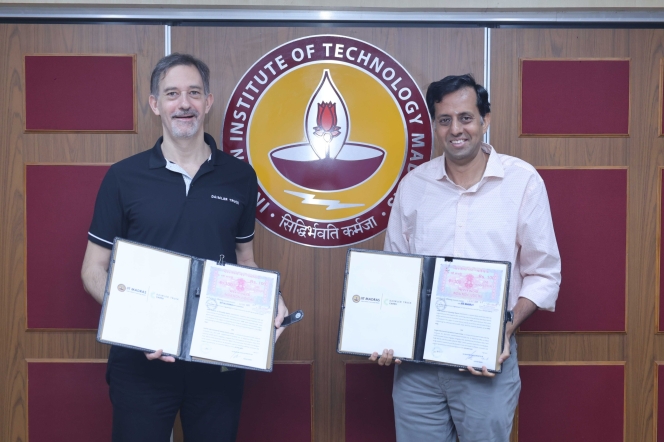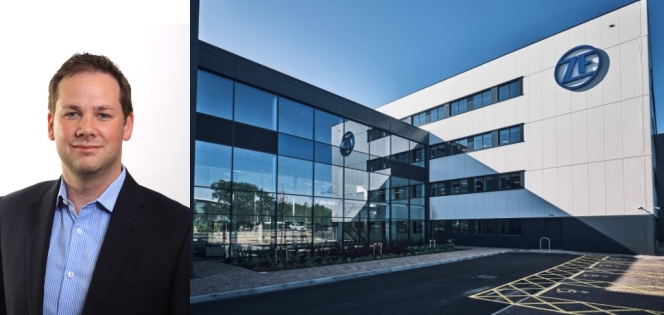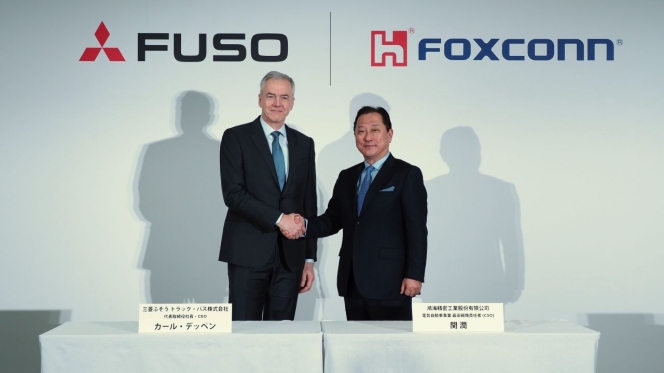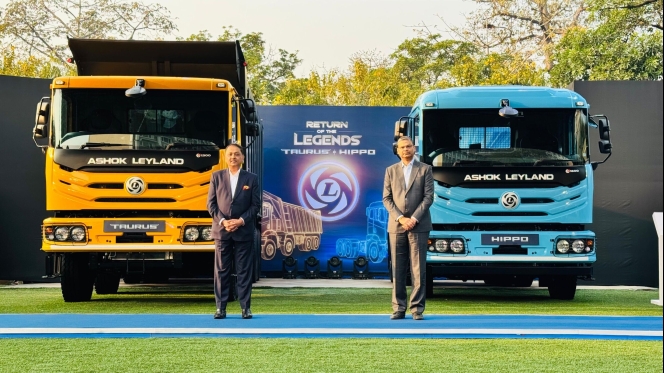Toyota Kirloskar Motor Supplies Hydrogen Fuel Cell Module To Ashok Leyland
- By MT News
- January 05, 2023

Toyota claims that it continues to focus on the hydrogen technology and promotion of the fuel cell module usage across various sectors to enhance wider adoption and achieve scalability. According to the company, the hydrogen fuel cell module provides energy source to serve various applications which is essentially the key to realise competitiveness and the creation of future sustainable hydrogen society. Further to achieve zero CO2 emissions in more challenging applications, such as trucks and heavy transport, trains, buses, aviation, shipping, forklifts and industrial processes, hydrogen will play an important role. Towards this direction, Toyota Kirloskar Motor (TKM), today, announced the supply of its Fuel Cell Module (one unit) to Ashok Leyland to build fuel-cell commercial vehicle in India for proto examination and feasibility study purpose.
When it comes to hydrogen-based electrified vehicle technology, fuel cell module is the heart which powers the hydrogen electric powertrain. Toyota states that given its strong technological capabilities, it intends to move forward in sure-footed steps to promote and enhance the use of fuel-cell modules in India to develop zero carbon emission vehicles.
As per Toyota, its hydrogen fuel cell-based technology can help enable faster shift away from fossil fuels, promoting renewable energy, achieving energy self-reliance and mitigating carbon emissions. Moreover, given India’s energy mix, its unique consumer profile and needs, infrastructure readiness and the government’s diversified efforts towards becoming ‘Atmanirbhar’ in energy by 2047, Toyota claims that it is advancing mobility solutions with greater agility. This is resulting in introducing and supporting multiple clean technology pathways by joining hands with other stakeholders with mutual interests and the aim to contribute to the nation’s carbon neutral targets.
Commenting on the clean mobility initiative, Sudeep S Dalvi, Senior Vice President and Chief Communication Officer of Toyota Kirloskar Motor, said, “We are extremely happy to supply hydrogen fuel cell module to Ashok Leyland for building fuel cell commercial vehicle for proto examination and feasibility study purpose. Reducing tailpipe emissions and carbon footprint has always been extremely important for us at Toyota, and we are also committed to contribute towards the national target of energy self-reliance. Globally, the energy industry is working on the technological innovations of carbon-neutral fuels, such as hydrogen and biofuels. Through this initiative, we hope to promote a wider use of hydrogen as a fuel which can help to create a hydrogen society in harmony with nature.”
The Government of India announced the National Hydrogen Mission (NHM) in the Union Budget for 2021-2022. NHM has drawn a roadmap for the usage of hydrogen as an energy source. This mission aims to push for the implementation of hydrogen energy that will drive the country in the right direction of making the best out of the renewable energy sector. Aligning with this, Toyota states that it is enhancing its technological strengths to capitalise on the most abundant elements on earth for a better, safer and cleaner alternative fuel option.
Sharing his views, Dr N Saravanan, Chief Technology Officer of Ashok Leyland, said “Ashok Leyland is excited to collaborate with Toyota Kirloskar Motor to bring their globally renowned and proven fuel cell module system to the commercial vehicle sector in India. Ashok Leyland’s track record in bringing innovative and differentiated products, combined with Toyota’s technology leadership in fuel cells, has created a massive opportunity to conduct proto examination and feasibility study towards decarbonising both goods and people transportation.”
The fuel cell electric vehicles use a propulsion system like that of electric vehicles, where energy stored as hydrogen is converted to electricity by the fuel cell. According to Toyota, these FCEV are fuelled with pure hydrogen gas stored in a tank. Similar to conventional internal combustion engine vehicles, FCEVs are equipped with other advanced technologies to increase efficiency, such as regenerative braking systems that capture the energy lost during braking, and store it in a battery.
- Daimler India Commercial Vehicles
- DICV
- Indian Institute of Technology Madras
- IIT Madras
- Prof. Ashwin Mahalingam
- Alexander Schoen
IIT Madras, Daimler India Commercial Vehicles To Develop Driver Rating System
- By MT Bureau
- February 02, 2026

The Indian Institute of Technology Madras (IIT Madras) and Daimler India Commercial Vehicles (DICV) have signed a Memorandum of Understanding (MoU) to develop a rating system for commercial driving. The partnership aims to establish a framework for driving standards, insurance assessments and background checks.
The project focuses on creating a technology stack to support a digital public infrastructure for a nationwide rollout. This initiative addresses the current difficulties in monitoring commercial driver performance, safety and well-being, which are often affected by inconsistent standards and limited accountability.
The system will use data-driven approaches, leveraging smartphone inputs and vehicle sensor data to evaluate driving behaviour. The goal is to provide fleet operators, insurers and government bodies with a tool to track performance and compliance in real time.
Prof Gitakrishnan Ramadurai, Project Coordinator at IIT Madras, said, “Trucks and truck drivers are the backbone of our country. This project provides them an aadhaar for their good work. The driver rating system rewards good driving and helps correct risky driving thereby saving lives, money and time for all stakeholders.”
The collaboration combines academic research with industrial application to translate data into scalable products. By incentivising responsible driving, the system is intended to improve employability for drivers and provide data for policymaking.
Prof. Ashwin Mahalingam, Dean of Alumni and Corporate Relations at IIT Madras, said, “IIT Madras has been at the forefront of research in road safety and mobility, with the goal of building systems, processes, and infrastructure that ensure safer outcomes for our roads, drivers and commuters. Our partnership with Daimler is a testament to our shared commitment to this vision and also emphasises how industry-academia collaborations play a crucial role in translating research into impactful, scalable and ready-to-implement products and processes that deliver meaningful societal impact.”
For Daimler India Commercial Vehicles, the partnership aligns with corporate sustainability goals focused on driver professionalism and safety within the transport ecosystem.
Alexander Schoen, Chief Financial Officer, Daimler India Commercial Vehicles, stated, “At DICV, road safety and responsible mobility are central to how we approach sustainability. This collaboration with IIT Madras reflects our commitment to using technology and data-driven innovation to create meaningful, scalable solutions that improve driver safety, professionalism, and well-being across the commercial transport ecosystem. By contributing to the development of a universal driver rating framework, we aim to support safer roads, stronger livelihoods, and a more accountable mobility system for India.”
Jake Morris Succeeds Bal Panaser To Lead ZF’s UK R&D Hub
- By MT Bureau
- January 26, 2026

German technology company ZF Group has appointed Jake Morris as the Site Leader for ZF Hub UK, located in Solihull, effective from 1 January 2026.
Morris assumes responsibility for the leadership of the technical centre, which opened in 2021 to support the company’s research, development and manufacturing footprint in the UK.
He has spent over 25 years with ZF, holding positions in portfolio management, finance, purchasing and engineering. In addition to his new role, he will continue to oversee the global steer-by-wire strategy, a technology that replaces mechanical steering connections with electronic signals. His previous experience as Portfolio Director involved managing steering product strategies for mobility technologies.
At present, the Solihull facility serves as a centre for advanced engineering and testing across the automotive, industrial and aerospace sectors. The site has contributed to the development of autonomous driving systems and steer-by-wire technologies. It houses a testing facility used by both ZF and external customers to validate new technologies within the UK’s automotive sector.
Morris succeeds Bal Panaser, who is retiring following a career of more than 40 years in the automotive industry. Panaser was involved in the establishment and management of ZF’s operations in the UK. Morris will now focus on the site’s integration into ZF’s global technology roadmap and the delivery of engineering solutions.
“I am proud to take on this role and to lead the talented teams at the ZF Hub UK. The site has a strong legacy within both ZF and the automotive industry, with significant history of automotive technology development and testing. For instance, technologies including ZF’s autonomous driving and Steer-by-Wire technologies began life at the site. I look forward to working closely with colleagues and partners to continue delivering innovative technology solutions for our customers and supporting ZF’s long-term success,” said Morris.
- Mitsubishi Fuso Truck and Bus Corporation
- MFTBC
- Hon Hai Technology Group
- Foxconn
- Katsuto Kora
- Mtisubishi Fuso Bus Manufacturing
- MFBM
- Foxtron Vehicle Technologies
- MODEL T
- MODEL U
- FUSO
- Karl Deppen
- Jun Seki
Mitsubishi Fuso, Foxconn To Form A New Standalone Bus Company In Japan
- By MT Bureau
- January 26, 2026

Mitsubishi Fuso Truck and Bus Corporation (MFTBC) and Hon Hai Technology Group (Foxconn) have announced plans to establish a new standalone bus company, which will be headquartered in Kawasaki, Japan.
The new entity will be led by Katsuto Kora as the designated Chief Executive Officer. The transaction is expected to close in the second half of 2026, subject to regulatory and shareholder approvals.
The partnership involves Mitsubishi Fuso Bus Manufacturing (MFBM) and Foxtron Vehicle Technologies, which will cooperate on the development, production, supply chain management and sales of zero-emission buses, starting with the MODEL T and MODEL U models. Operations will be based at a plant in Toyama, where vehicles will be manufactured under the FUSO brand.
The new OEM brand will focus on the launch of electric buses for domestic and international markets while maintaining the existing internal combustion engine portfolio. By using local development and production, the company aims to comply with Japanese regulations and quality standards. The project integrates Foxconn’s software and electronics expertise with MFTBC’s experience in commercial vehicle manufacturing.
The new entity will function as a dedicated original equipment manufacturer (OEM). The collaboration follows a previous memorandum of understanding regarding zero-emission mobility. MFTBC is 89.29 percent owned by Daimler Truck AG, with the remainder held by Mitsubishi group companies.
Karl Deppen, CEO, MFTBC, said, “We are excited to join forces with Foxconn. This collaboration will combine the strengths of both parties to accelerate our transformation in the bus sector. By combining FUSO and Foxconn’s extensive experience and technological know-how, we will offer customers state-of-the art solutions for public transport, thereby contributing to society both in Japan and abroad.”
Jun Seki, Foxconn Chief Strategy Officer for EVs, added, “Mobility is a strategic priority for Foxconn. This collaboration with MFTBC will provide a comprehensive electrification solution for Japan’s transportation ecosystem. This approach will significantly shorten development cycles and enhance cost-efficiency.”
Katsuto Kora, designated CEO of the new company, stated, “The new joint venture will integrate the corporate cultures of both companies, blending Japan’s spirit of manufacturing excellence with Foxconn’s agility and technological prowess. Given the extensive existing partnerships of both shareholders, we expect even broader collaboration opportunities in the field of future technologies in the years to come. Our focus will be on meeting customer expectations not only for current conventional ICE improvement but also for zero-emission transportation and leading FUSO bus into a new era of digitalisation and electrification.”
Ashok Leyland Reintroduces Taurus And Hippo Heavy-Duty Truck Range
- By MT Bureau
- January 22, 2026

Ashok Leyland, one of the leading commercial vehicle manufacturers, has reintroduced the Taurus and Hippo nameplates to its heavy-duty truck portfolio.
In its new avatar, the Taurus will serve as the brand’s high-horsepower tipper range, while the Hippo anchors the tractor segment. Both vehicles are built on the AVTR modular platform, allowing for various configurations to meet specific haulage requirements.
The new range is powered by an 8.0-litre A-Series 6-cylinder engine, producing 360 HP and 1,600 Nm of torque. These vehicles feature reinforced chassis and heavy-duty drivetrains designed for mining, infrastructure and construction applications. The modular architecture is intended to improve component life and fuel efficiency while reducing driver fatigue through updated cabin ergonomics.
The Hippo was a prominent heavy hauler from the 1980s until the early 2000s, while the Taurus was known as the first multi-axle truck in India. The reintroduction of these names targets the medium and heavy commercial vehicle (MHCV) industry, specifically segments involving bulk commodities, industrial raw materials and over-dimensional cargo (ODC) transportation.
Bookings and deliveries for both ranges have commenced through dealerships nationwide. The company aims to use these models to consolidate its position in the high-horsepower segment of the Indian market.
Shenu Agarwal, Managing Director & CEO, Ashok Leyland, said, “Taurus and Hippo are purpose-built for heavy-duty requirements of mining, infrastructure, and construction applications. The new truck range is powered by Ashok Leyland’s A-Series 6-cylinder engines, now with industry-leading peak torque and power, delivering unmatched durability and reliability, higher productivity and faster turnaround times.”
Sanjeev Kumar, President – MHCV, Ashok Leyland, added, “Hippo and Taurus aren't just product names; they are legends that earned the trust of generations of Indian transporters. These names became synonymous with heavy-duty performance across Indian highways and mining sites, and that's the legacy we're building upon. Tippers and tractors are among the fastest-growing segments in the MHCV industry, playing a critical role in India’s infrastructure growth. Operating in harsh terrains and extreme conditions, these vehicles demand superior reliability, robustness, and driver comfort.”







Comments (0)
ADD COMMENT